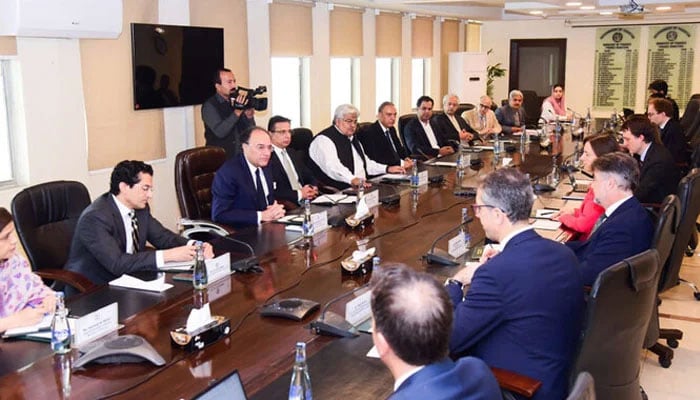
ISLAMABAD: Federal Finance Minister Muhammad Aurangzeb has categorically ruled out the possibility of the government introducing a mini-budget after constructive talks with the International Monetary Fund (IMF).
Speaking to Geo News on Saturday, the finance minister said: “The discussions with the IMF were constructive and productive. Virtual negotiations with the IMF, however, are ongoing, as certain points required in-person discussions.”
The finance czar’s remarks came after the IMF’s mission — led by Nathan Porter — concluded a staff visit to Pakistan from November 12 to 15.
Expanding on the IMF team’s visit, the minister emphasised that open and fact-based dialogue was held with the IMF team. According to the finance minister, the global lender’s delegation listened carefully to Pakistan’s position and appeared satisfied with the discussions.
“The purpose of the IMF’s visit was not to review the economy but to build confidence,” stressed Aurangzeb, who is a first-time finance minister, with a long working experience in the private banking sector.
In a statement earlier today, the global lender said it has urged Pakistan to broaden its tax base by targeting untapped revenue sources — as the country grapples with challenges in expanding its tax collection.
The Fund said the staff visits are standard practice for countries with semi-annual programme reviews and aim to engage with the authorities and other stakeholders on the country’s economic developments and policies and the status of planned reforms.
“We had constructive discussions with the authorities on their economic policy and reform efforts to reduce vulnerabilities and lay the basis for stronger and sustainable growth,” Porter said in a statement.
The official added that the visiting delegation and the Pakistani authorities agreed on the need to continue prudent fiscal and monetary policies and revenue mobilisation from untapped tax bases while transferring greater social and development responsibilities to provinces.
In addition, he said, structural energy reforms and constructive efforts are critical to restore the sector’s viability.
The IMF, meanwhile, said it was encouraged by the Pakistani authorities’ reaffirmed commitment to the economic reforms supported by the 2024 Extended Fund Facility (EFF).
Govt to continue with SOEs’ privatisation
Moreover, the finance minister termed the failed Pakistan International Airline’s (PIA) privatisation move a “setback” for the government but stressed that the IMF listened to the government on this and privatisation of state-owned enterprises would continue.
“We will continue with it and not only PIA but all state owned enterprises like Gencos, DISCOs and airports will be privatised gradually,” FinMin Aurangzeb clarified.
In relation to the power sector, he mentioned that work is being done on the transmission and distribution side and Federal Minister Awais Leghari is doing a good job in this matter.
The finance minister further said that National Fiscal Pact approval was delayed by eight to ten days but he explained it to the IMF delegation and they appreciated it.
The provinces have supported the National Fiscal Pact and Minister Aurangzeb personally thanked Sindh’s Chief Minister Murad Ali Shah for being forthcoming on this matter.
“When it comes to national interest, the KP government has [also] always stood with the federal government,” he further highlighted.
“We are continuing the rightsizing of the government and it has been completed in 11 ministries and exercise is underway for the other five ministries’ rightsizing.
To say that nothing has been done to reform the pension scheme is not fair because civil bureaucracy will be contributing to the pension scheme,” he asserted.






